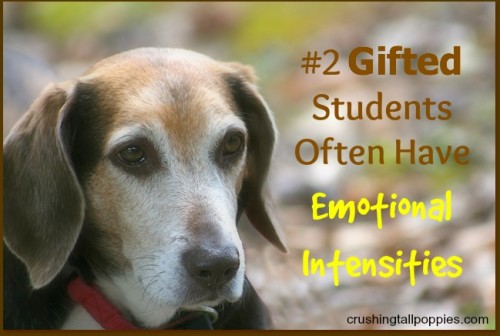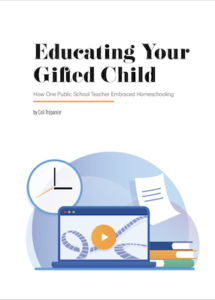#2 Gifted Students Often Have Emotional Intensities

“Emotional intensity in the gifted is not a matter of feeling more than other people, but a different way of experiencing the world: vivid, absorbing, penetrating, encompassing, complex, commanding – a way of being quiveringly alive.”
A quote from Emotional Intensity in Gifted Children by Leslie Kay Sword
In my recent blog post A Gifted Child Checklist for Teachers , I listed ten basic characteristics and traits of gifted children. It is a list intended to easily help teachers and others by providing a brief and basic listing of gifted traits and characteristics which aren’t always so well-known, recognized or obvious. I also hoped my checklist would bust some myths and correct some incorrect information about giftedness.
My last post discussed #1 on the checklist – which is also #10 because I felt this one to be a very significant one to remember. I will continue to address each of the topics listed on the checklist, one post at a time. Now, we will tackle #2 – gifted students often have emotional intensities. There are so many great resources, websites and books that provide information on the emotional intensities of the gifted, and I have listed a few at the end of this post. My contribution with this post will be to share my personal experience with the emotional intensities of the gifted.
The three months leading up to the beginning of my youngest gifted son’s last year in public school were unfortunately wrought with tragic events–the death of his beloved dog and just one week later, his grandfather who was his hero died also. My son had just two weeks after his grandfather’s funeral to gather himself up after all this painful event and put on a good face to start school. I let his teachers know the traumatic summer he had had because–well, because I felt that as human beings we all want to treat each other kindly especially when someone is in need of consideration, and maybe they would keep this in mind during interactions with him. Had any of his teachers understood the depth of the emotional intensities gifted children can posses, maybe they would have understood why he had falling grades all of a sudden, why he wasn’t turning in homework and why he wasn’t performing as expected. His emotional intensity was making it very difficult for him to meet the demands of school. Instead, his teacher’s expectations of him stemmed from their belief, a belief that many others erroneously hold, that he was gifted and he should be excelling in school. When he didn’t meet their expectations, their “diagnosis” was that he needed to work harder, toughen up and stop being lazy. The emotional effects from that last school year still plaque him today.
Yes, gifted children come packaged with intense emotions that may seem abnormal to some – crying at inopportune times, anger at what the rest of us would think are small injustices, and deep sorrow for events others deem as everyday occurrences. Teachers, parents and any adult who teach, raise or interact with gifted children should be aware of the emotional intensities of gifted children, and they should understand that this is NOT an abnormal behavior or mental deficiency that needs to be “fixed”, either by the child, his parents or a professional.
The very first time I came face to face with the emotional intensities of my youngest gifted son was when he was four years old. At that time, we lived in an area of Louisiana where hunting was extremely popular and everyone was very passionate about it. My son and I were in the car heading to a birthday party he had been invited to. We were stopped at a traffic light, and in front of us was a pick-up truck with a muddy four-wheeler parked in the bed of the truck. A lifeless prized buck had been irreverently strapped across the seat of the four-wheeler, its body draping over both sides of the 4-wheeler seat. My four year old saw this sight from his car seat in the back seat and launched into a crying, screaming angered speech about how this was morally and ethically wrong and disrespectful. He was so distraught over this dead deer, that we had to skip the birthday, turn around and go home. It took a few days for my then four year old to recover from this emotional event. It was so intense, that even I remember this entire event vividly – color of the truck, where the stop light was located, brand of four-wheeler and the parking lot I had to turn around in! If the buck had a name, I probably would have remembered that too!
 Here is the last personal experience I’ll share on how emotional intensities may present themselves: Our well-loved and spoiled beagle, Felix, who our son got on his second birthday, was treated like a member of the family. We brought him everywhere with us–long drives, boating, fishing, vacations. But, he seemed to have more than his share of health issues which we dug deep to take care of–a “bionic” knee surgery and enumerable diuretics and heart medicines for his congestive heart failure. He was well-loved and well taken care of. As such, we had made up a little diddy of a song we sang to him often. When he died, we got another male beagle puppy. One day, I started singing Felix’s song to our new puppy, but I had replaced Felix’s name in the song with the name of our new puppy, Fletcher. I was SO blindsided and taken aback at my then 12-year-old son’s swift and intense emotional response to hearing me singing Felix’s song to Fletcher. It was a whopper of an emotional event–anger, tears, sorrow and incredulousness at my disrespect for our deceased Felix. Some little thing I would not have thought twice about had been perceived so emotionally intensely by my gifted son as a significant moral and ethical breach on my part. I swear, I have made a concerted effort to never sing Felix’s song to Fletcher, although I have caught myself about to. Fletcher now has a little diddy of his own!
Here is the last personal experience I’ll share on how emotional intensities may present themselves: Our well-loved and spoiled beagle, Felix, who our son got on his second birthday, was treated like a member of the family. We brought him everywhere with us–long drives, boating, fishing, vacations. But, he seemed to have more than his share of health issues which we dug deep to take care of–a “bionic” knee surgery and enumerable diuretics and heart medicines for his congestive heart failure. He was well-loved and well taken care of. As such, we had made up a little diddy of a song we sang to him often. When he died, we got another male beagle puppy. One day, I started singing Felix’s song to our new puppy, but I had replaced Felix’s name in the song with the name of our new puppy, Fletcher. I was SO blindsided and taken aback at my then 12-year-old son’s swift and intense emotional response to hearing me singing Felix’s song to Fletcher. It was a whopper of an emotional event–anger, tears, sorrow and incredulousness at my disrespect for our deceased Felix. Some little thing I would not have thought twice about had been perceived so emotionally intensely by my gifted son as a significant moral and ethical breach on my part. I swear, I have made a concerted effort to never sing Felix’s song to Fletcher, although I have caught myself about to. Fletcher now has a little diddy of his own!
To learn and understand more about emotional intensities in the gifted, here are a few resources with links to point you in the right direction:
RESOURCES AND LINKS:
Emotional Intensity in Gifted Children
SENG – Supporting Emotional Needs of the Gifted
Emotional Intensity in Gifted Children
Tips for Working With Emotional Intensity
BOOKS:
Living With Intensity: Understanding the Sensitivity, Excitability, and the Emotional Development of Gifted Children, Adolescents, and Adults from Great Potential Press
Emotional Intensity in Gifted Students: Helping Kids Cope with Explosive Feelings by Christine Fonseca
RELATED POST:
One Spoonful of Peas: Parenting a Gifted Child with Emotional Intensities
 Crushing Tall Poppies
Crushing Tall Poppies




Pingback: 9 Things the World Must Understand About Gifted Children | Crushing Tall Poppies
I am a gifted individual with high Emotional OE. My other overexcitabilities max out, but my emotional tends to be the highest (at a 5). Due to this, I am highly empathic, emotionally astute, and experience emotions to a high extreme. I could relate to everything in your article.
Hi Lang,
Thank you for sharing your experience with your emotional overexcitabilities and I’m happy you can relate to this article. It’s not easy being highly empathetic–it can sometimes cause us to care more for others and forget about our own needs.
~~Celi
Pingback: A Gifted Child Checklist for Teachers | Crushing Tall Poppies
Pingback: Six Unexpected Signs that Your Preschool or Kindergarten Child Might be Gifted - Mackintosh Academy - An IB World School for Gifted Children
Pingback: As President, What Will You Do for Gifted Education? | Crushing Tall Poppies
Pingback: I Have a Gifted Kid and I Will No Longer Be Ashamed | Crushing Tall Poppies
Pingback: Gifted Children—About THAT Stereotype | Crushing Tall Poppies